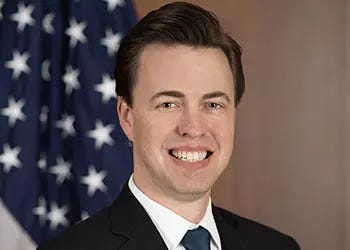Talking Debanking; Trump Selects More Regulatory Chiefs; FHFA Nominee Named in Campaign Finance Complaint
Capitol Account: Free Weekly Edition
Change is hitting Washington like a hurricane, and the financial regulatory agencies aren’t exempt from the maelstrom. That’s especially true for the CFPB, which is straight in the sights of the Trump administration’s effort to dismantle the federal bureaucracy. The agency was effectively shut down on Monday, and its supporters spent the week frantically filing court orders as scores of employees were dismissed. The president also chose nominees to lead three major financial agencies: the consumer bureau, OCC and CFTC. The picks were more Washington hands than MAGA bomb throwers, with decades of D.C. experience between them.
The SEC kept busy as well. It moved to stop defending Gary Gensler’s climate rule in court, and rescinded his controversial guidance that made it harder for companies to block shareholder proposals on social issues. The Fed chairman testified before both the House and Senate where he was barraged with regulatory questions. We also reported on the FHFA nominee’s past political donations, and dug into a complaint filed with the Federal Election Commission that names him. For our Friday interview, we talked to the chairman of Silvergate Bank who has some thoughts on debanking and crypto policy.
Thanks for reading our digest of articles published this week. To stay on top of the news, click the button below and subscribe to the daily newsletter.
Friday Q and A: Thanks to Donald Trump and a handful of his high-profile Silicon Valley supporters, debanking is taking up a huge amount of oxygen in Washington at the moment. The brouhaha isn’t likely to disappear quickly either, as multiple congressional investigations get underway and policy makers look for solutions. Just this week, Jamie Dimon, Brian Moynihan and other big bank CEOs were hauled up to Capitol Hill to discuss the issue. Even Fed Chairman Jerome Powell told lawmakers he was troubled about reports that financial firms are refusing to do business with unfavored industries, and he pledged to look into what role supervision may play in the cutoffs.
Cue the story of Silvergate Bank. The once sleepy California firm experienced massive growth during the crypto boom by doing something unique: deciding to bank digital asset companies almost exclusively. The strategy brought in a huge amount of business, and Silvergate did a decent job managing its risks – it went through what many believe is the largest run a bank has ever survived. Yet in 2024, the firm filed for bankruptcy. What happened?
Mike Lempres, Silvergate’s chairman, casts the blame largely on Biden administration regulators. We sat down with him this week to hear what happened – and what lessons he takes away. Read on for the harrowing tale, as well as his thoughts about the future of crypto policy in Washington. Yes, he’s excited. What follows is our (lightly edited and condensed) conversation.
Capitol Account: Tell us about yourself.
Mike Lempres: I love, love crypto. [That’s] the headline.
CA: You have a pretty traditional background for someone who is now a digital assets evangelist.
ML: I'm a lawyer by training. I spent a big chunk of time at the Department of Justice, in senior positions. I thoroughly enjoyed that experience. From there it was Big Law, which I enjoyed less. I went in-house originally at an options and equities exchange in San Francisco, the old Pacific Coast Stock Exchange.
CA: When did you first get involved with crypto?
ML: I became the lead lawyer at Silicon Valley Bank…We call it crypto now, at the time it was just bitcoin – and there wasn't much to it. It was around 2012, 2013, and the question…was, can we bank this stuff? Can we support companies that are in this space? Will our regulators let us? It became my job to look into that. I found [it] fascinating. I completely bought into the future.
CA: Talk about Silvergate. It was a small bank, less than $1 billion in assets, before it pivoted to serve crypto companies.
ML: In 2013, [Silvergate] discovered this market that needed to be banked, or that was demanding to be banked – the crypto market. Silvergate got in there, working closely with regulators. Can we do this? How do we do it? Is there a safe and sound way to do it?
CA: The bank grew quickly.
ML: There was such demand…In 2022, we'd gone from what had been a sleepy Southern California commercial real estate bank to a $14 billion [in assets] publicly traded institution focused almost exclusively on serving crypto companies.
CA: Washington has been digging into debanking, and some say Silvergate’s demise can be seen as an example of an entire bank essentially getting debanked.
ML: I completely agree. Most people don't know the amount of authority and power that regulators have over individual banks.
CA: Are supervisors demanding that banks deny services to digital asset companies?
ML: One of the misunderstandings is that people are looking for some kind of smoking-gun memo that goes from a regulator to a bank, saying drop person A or person B, or company A or company B. While that does happen, it's very rare.
CA: How does it play out in practice?
ML: The far more common occurrence is the regulators just ask some questions. They express some concerns, some reservations, and that's really all it takes to debank most customers. Why would a bank take the risk of offending their regulator over a customer, even a large customer? You wouldn't do it, because regulators have got so much authority and so many ways to hamstring a bank if they choose to. And Silvergate was a classic example.
CA: Crypto policy is at the top of Washington's agenda, but there are a lot of cooks in the kitchen so to speak. Will it be difficult to get new regulations completed?
ML: There's absolutely a path forward, and the rest of the world is figuring out a path forward. When you pull back, the challenge comes from the fact that the industry is still evolving. We don't know where it's really ultimately going to go. So you have to be careful about how you regulate it.
CA: Do crypto firms really want oversight?
ML: We're not crazy crypto anarchists from 2010…The industry just needs to understand what the rules are. There's a lot of tolerance for what those rules will be so long as they're reasonably commercial…(Friday)
Click here to subscribe and see the rest of the interview.
Thanks for reading. Follow us on X @CapitolAccount and on LinkedIn by clicking here. We’re always looking for stories, so if you have any suggestions on what we should cover (or comments about Capitol Account), shoot us a note. Rob can be reached at: rschmidt@capitolaccountdc.com and Ryan at rtracy@capitolaccountdc.com. If somebody forwarded this to you and you’d like to subscribe, click on the button below. Please email for information on our special rates for government employees, academics and groups: subscriptions@capitolaccountdc.com.
Trump Slate: Less than four weeks into his second term, Trump has now nominated nearly a full contingent of financial agency chiefs – and despite all the speculation, they are hardly a bunch of MAGA outsiders bent on dismantling the administrative state. In fact, the latest additions have decades of Washington experience between them: recently departed FDIC Director Jonathan McKernan to lead the CFPB, Jonathan Gould, an ex-OCC chief legal officer, to return as comptroller and former CFTC Commissioner Brian Quintenz to chair that agency.
Taken together, the names herald a conservative reversal of many aggressive Biden-era regulations. If confirmed, the appointees are sure to garner pressure from DOGE or the White House to cut costs and find “efficiencies,” leading to fights that will make their policy agendas harder to achieve. But broadly speaking, their selection doesn’t portend a populist upheaval, at least to most observers. That’s a development that has financial firms cheering at a moment where nothing seems stable in the nation’s capital.
What follows is a look at each nominee, and what their past views say about how they’ll lead.
McKernan: Trump’s nomination of a CFPB chief, in and of itself, signals that the administration sees the bureau as continuing to exist in some form. McKernan’s friends and former colleagues point out that he is no bomb thrower – rather a knowledgeable lawyer who understands how to navigate the bureaucracy, Congress and the media. And while he doesn’t have much of a recent track record when it comes to issues within the CFPB’s remit, it’s notable that he’s had no qualms about taking on big companies. That includes working with the agency's last director, Rohit Chopra, to boost the FDIC’s scrutiny of BlackRock and Vanguard.
Much of McKernan’s policy work has focused on housing and bank regulation. After stints at two large law firms, he went to Capitol Hill and was a counsel to Bob Corker while the senator was in the thick of a contentious struggle to overhaul Fannie Mae and Freddie Mac (another fight that put McKernan on the other side of some big Wall Street players). He then served at the Treasury Department, FHFA, and Senate Banking Committee under Pat Toomey before being sworn into a seat on the FDIC in January 2023.
Within months, the agency found itself mired in a banking crisis. McKernan’s first formal public statement, after the resolution of First Republic Bank, reflected his conservative views: “We should avoid the temptation to pile on yet more prescriptive regulation or otherwise push responsible risk taking out of the banking system,” he warned, calling for “ending our country’s bailout culture that privatizes gains while socializing losses.”
He opposed much of Chairman Martin Gruenberg’s progressive agenda, at one point blasting a revision of the FDIC’s merger guidelines as implementing “a bias against bank mergers.” But he worked with Democrats as well, teaming up with Michael Hsu to oversee an external probe into the agency’s workplace scandal and with Chopra to push for more oversight of asset managers’ bank stock holdings.
That fight, in particular, raised McKernan’s Washington profile. “DEI and other ESG were pushed on banks by BlackRock and other index fund complexes due in part to gaps in the banking regulators’ monitoring for undue influence,” he posted just this week on X, repeating a narrative the giant fund managers forcefully dispute.
McKernan voted against the original Basel endgame effort in 2023, but he also notably withheld his support for a revised proposal this fall – even as banking trade groups strongly wanted it to move forward. His critique related not only to process but substance: he branded as “nonsensical” an aspect of the plan that required banks to use two different methods to calculate certain risk exposures.
Early in the second Trump administration, McKernan showed he is willing to be a team player by voluntarily stepping down to make room for other Republicans on the FDIC board. He’ll of course be back if confirmed as CFPB director, giving him a vote on bank regulations as well as allowing him to stay engaged on the asset manager issue.
But running the CFPB, including undoing Chopra’s actions, managing DOGE’s demands and dealing with hundreds of furious employees should be more than a full-time job.
Gould: Financial regulatory watchers have a pretty clear idea what they’re getting with Gould, who has a long track record on the policies the OCC will be tasked with implementing…(Wednesday)
Click here to subscribe and read the full article.
Donations: Bill Pulte’s nomination as FHFA director hasn’t received a whole lot of attention, with the Washington financial regulatory crowd focused on a deluge of other developments and appointees. The quiet is a little surprising because the housing scion is a bit of a celebrity – at least on Elon Musk’s X, where Pulte hands out charitable donations and has more than 3 million followers. But as he heads toward an expected Senate confirmation hearing to lead the regulator of Fannie Mae and Freddie Mac, another piece of Pulte’s largesse is getting renewed scrutiny: his political giving.
Pulte was named in a 2022 Federal Election Commission complaint related to an alleged $500,000 straw-man contribution to a Super PAC supporting Trump. The accusations were brought before the FEC by the Campaign Legal Center, a watchdog group that bills itself as nonpartisan. The organization contends that Pulte or other “unknown persons” funneled the money to Make America Great Again, Again! Inc. in October 2021, via an LLC without disclosing the true source as required under campaign finance laws. The complaint underscores that the donation was at the time “the single largest contribution that MAGA Again has reported ever receiving.”
A spokesperson for Pulte, Erica Knight, said he “has always adhered to all FEC guidelines, as clearly outlined to the [Senate Banking] Committee. This baseless, politically motivated complaint is nothing more than a distraction, and his attorneys have formally requested its dismissal.”
It’s unclear what the complaint’s status is at the FEC, but there has yet to be a resolution. The agency “cannot provide any information regarding complaints that may be filed with the agency due to confidentiality rules,” a spokesperson said. That could change once the commission closes or settles the matter.
Shanna Ports, senior legal counsel at the campaign center, said it's not unusual for the commission to take years to act. “It really strikes at the core of the campaign finance laws,” Ports notes of her organization’s complaint. “Voters have a right to know who is giving money to political campaigns and political causes so that they can detect when an elected official is trading favors to wealthy donors.”
The donation at issue came from an entity called ML Organization, and it was provided at a time when Trump was regrouping from his 2020 defeat and preparing to run for president again. The LLC was organized in 2018 and had “no documented activities or verifiable presence,” suggesting it “neither conducted any real business nor had sufficient income” to make such a large contribution, the center’s filing with the FEC alleges. The entity, however, shares an address with a home Pulte owned in Boca Raton, Florida, it says.
Interestingly, Pulte appears to have acknowledged ownership of the LLC in a legal deposition last October that was conducted as part of a Florida libel lawsuit he is pursuing against a former executive of Pulte Group, the homebuilding giant founded by his grandfather. “I have experience with ML Organization LLC because it’s my LLC,” Pulte said when the opposing side’s lawyer brought up the donation, according to a transcript on the court docket. His lawyer objected before he could answer additional questions.
Under his own name, Pulte has given more than $300,000 to Trump-supporting Super PACs, Trump’s campaign and the Republican National Committee in 2024, records show…(Thursday)
Click here to subscribe and read the full article.





